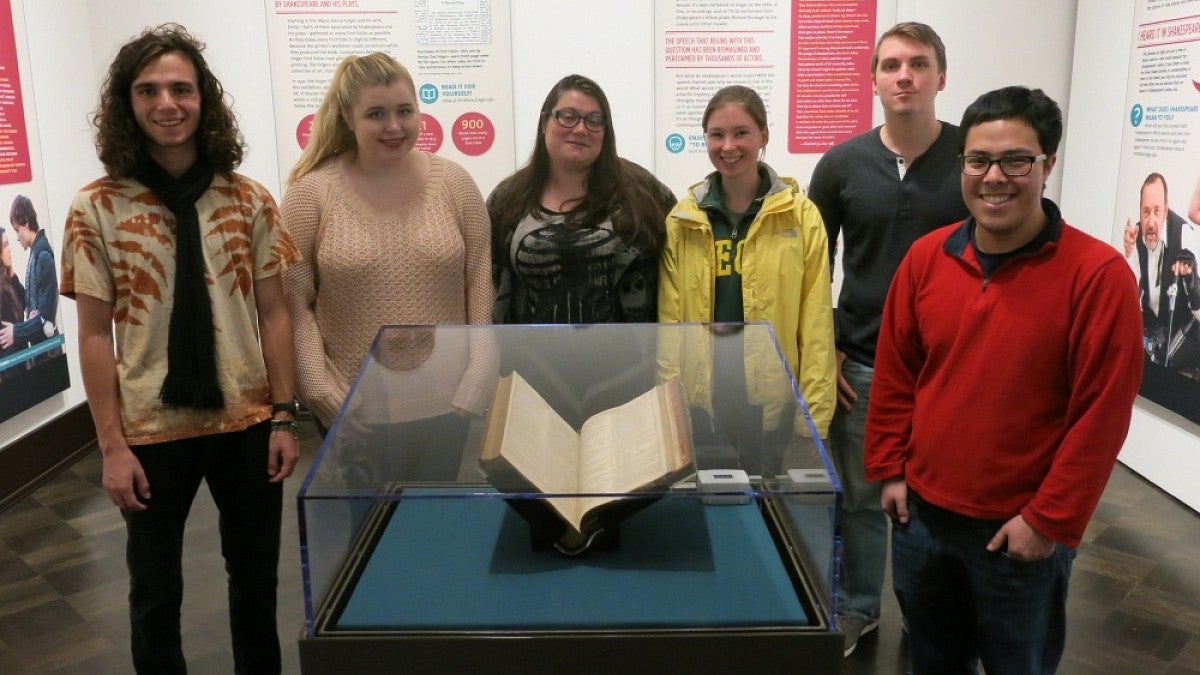Six University of Oregon students in the brand-new Humanities Undergraduate Research Fellowship Program are out to prove that research doesn’t always include test tubes, beakers and microscopes — it’s a necessary component in all fields of study.
The undergrads are members of the first-ever cohort of the innovative program, a 16-week initiative that provides academic and professional resources to all undergraduate students who conduct research for thesis projects.
“One of our main goals (with this program) is to help people understand what original research looks like outside of the sciences, since most people envision research taking place in a lab,” said Caitlyn Kari, director of communications in the Robert D. Clark Honors College at the UO.
To qualify for the fellowship, the undergraduate students must maintain a grade point average above 3.5, have the written support of their faculty mentor and commit to conducting 10 hours of research per week on their pre-selected project topic.
The award comes with a $2,500 stipend for research and required attendance at workshops, meetings and panel discussions throughout the four-month period. The cohort gatherings — which feature faculty, alumni and graduate student panels — focus on a range of issues, from career placement in specific humanities fields to identifying different concepts and research techniques.
Ultimately, the six students will present their research projects at the annual Undergraduate Research Symposium during spring term.
“In my judgment, this new program is a significant milestone that we’ve reached in the humanities,” said Paul Peppis, a professor in the UO Department of English and director of the Oregon Humanities Center. “This program is very consistent with the president’s priority of promoting and supporting the research excellence of the university — now, we in the humanities can demonstrate that all the way from undergrads to faculty.”
The humanities fellowship program was established through the Undergraduate Research Opportunity Program, headed by program manager Karl Reasoner. Because Reasoner’s opportunity program had created a similar research opportunity for undergraduates in the natural sciences and chemistry, they collaborated with the Oregon Humanities Center to make the Humanities Undergraduate Research Fellowship Program a reality.
“The program was established to help research goals institutionwide,” Reasoner said. “Now we have something in the natural sciences and something in the humanities — we’re really hoping to build an inclusive culture of research on campus that is for everyone.”
Beyond gaining practical research experience, the undergraduates in the program have the opportunity to hone their professional skills in many areas, such as critical thinking, data analysis and academic writing. Much of their research will be submitted for publication to scholarly journals.
“There is a popular myth out there that there is no value in a humanities undergraduate degree,” Peppis said. “There’s actually considerable statistical and testimonial evidence that proves this is indeed a myth; we have former humanities students that now work in medicine, in education, in Hollywood, in journalism and in other areas because we teach skills and help develop capacities that are relevant to all of those contexts and more.”
The six 2016 Humanities Undergraduate Research Fellowship inaugural recipients are:
Amanda Perkins
Major: History
Faculty Mentor: Trond Jacobsen
Project: “Masculinist or Humanist? An Analysis of Rhetoric in College Debate”
Augustine Beard
Major: History
Faculty Mentor: Mark Carey
Project: “History of Perceptions of Wildfire Risk and Management”
Brandi Wilkens
Major: Art History
Faculty Mentor: Akiko Walley
Project: “Not Just a Pretty Face: 19th c. Japanese Courtesans and Their Influence in Art Exportation”
Colin Takeo
Major: Music History
Faculty Mentor: Loren Kajikawa
Project: “Signifying Socialism: Apply Peircean Semiotics to the GDR’s Musikfest des VDK”
Samuel Rodgers
Major: English and Economics
Faculty Mentor: Courtney Thorsson
Project: “James Baldwin across Literary Forms”
Sarah Carey
Major: Philosophy
Faculty Mentor: Steven Brence
Project: “Subjectivity & Recognition: French Algeria to France Today”
The program is sponsored by the Oregon Humanities Center, the Office of the Vice President for Research and Innovation, the Undergraduate Research Opportunity Program and the Division of Undergraduate Studies.
— By Nathaniel Brown, Public Affairs Communications


